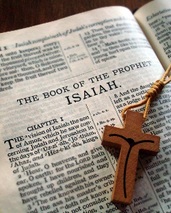Isaiah on 'Theology of Mission' as Man's Purpose  Man has wrestled with the fundamental questions of existence since before thoughts were recorded. Modern man is still seeking answers to “What is the meaning of life?” and ultimately “Why are we here?” Yet nearly 2,700 years ago, the prophet Isaiah was whisked into the throne room of God and received untold revelations directly from the sovereign Creator Himself on such matters. True to his calling the answers were concealed in such a way that people will “be ever hearing, but never understanding; be ever seeing, but never perceiving” (Isaiah 6:9). Throughout the collected sixty-six books of Isaiah's prophesies several themes reveal the answer. First, the sinful and wicked nature of both God's chosen people and the nations is clearly evidenced as man's barrier to the presence of God. This evil against themselves, others, and God Himself demands justice, which is manifested as the wrath of God. Then a third theme (which seems irreconcilable at first) of God's mercy for His chosen people and the nations runs parallel to the lengthy passages of judgment. These paradoxical attitudes of God amazingly find harmony through yet another theme, that of a Messiah. Described in detail, while indirectly, The Messiah would take man's place and receive God's judgment of evil as their substitute, so that any, including outsider nations, could now enter into God's presence. Thus the answer to man's questioning fully appears in the final theme: sharing the message of the Messiah's redeeming actions to not only His chosen people, but also all nations, peoples, foreigners, and Gentiles.
2 Comments
 Eschatology, the study of last things or the end of the world, has been an unnecessary stumbling block and source of division within the church. Believers should approach the topic with grace and charity, especially since many details about the end are derived from apocalyptic literature which tends to be metaphorical and vague. Fortunately, there are areas within eschatology in which all should agree (dogmas), areas of flexibility (doctrines), and areas of freedom (details).  Luis 'Morpheus' Molina Have you ever wrestled with the issue of God's sovereignty, with Calvinism (TULIP) and Arminianism on opposing sides? It's a tense debate that has raged since the 16th century, and the root of the problem is choice (free will). Church history reveals that others have dealt with the subject as well, including Luis Molina in his disputations (in Latin): Concordia liberi arbitrii cum gratiae donis. Disputatio 47-53 Since Molina on divine foreknowledge: part IV of the Concordia is Scholasticism in full gear it can be a challenging read, but it's the subject matter of dealing with "how does God know what knows" that can make you feel a lot like Alice...tumbling down the rabbit hole. Here is a brief overview of his work, and the foundation of Molinism, if you'd like to see how deep the rabbit hole goes. |
AuthorBrett Yardley: Categories
All
Archives
January 2019
|

